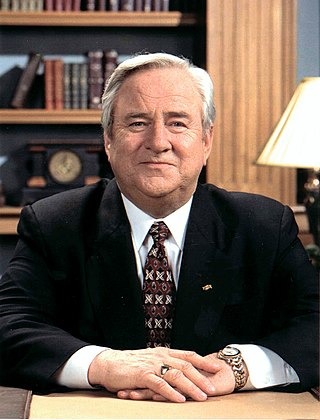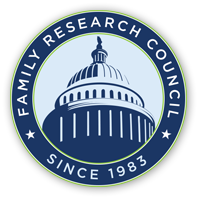
Colorado for Family Values was a socially conservative advocacy group in Colorado, United States. [1] It existed from 1990 [2] to 2002.

Colorado for Family Values was a socially conservative advocacy group in Colorado, United States. [1] It existed from 1990 [2] to 2002.
It was co-founded by Tony Marco, Kevin Tebedo and David Noebel in the early 1990s. [1] [3] Will Perkins, a former car dealer from Colorado Springs, was the chairman of the board. [3] [4] Originally, it was called the Colorado Coalition for Family Values, but they dropped the word 'coalition' after a radio presenter said it sounded Marxist. [5] Some have argued, because of the proximity of timing for the moving of Focus on the Family to Colorado Springs, that James Dobson's move to Colorado Springs in 1991 led to its establishment. However, it was truly coincidental timing as Focus on the Family had nothing to do with the founding of Colorado for Family Values. Dobson's Focus on the Family is independent from Colorado for Family Values. [6] [7] It has also been linked to Traditional Values, Summit Ministries, Concerned Women for America, and the Eagle Forum. [1] Bill McCartney, the founder of Promise Keepers, is a supporter. [5] [8]
Colorado for Family Values was created specifically for the purpose of countering an objective of the Colorado Human Relations Commission, to introduce legislation that would effectively add the behavior of homosexuality to the list of protected class status, thus creating the legal process of strict scrutiny for claims of discrimination made by homosexual individuals. It drafted and promoted Amendment 2 in 1992, which led to the United States Supreme Court case Romer v. Evans . [9] [10] [11] [12]
Colorado for Family Values was dissolved in 2002 according to the records of the Colorado Secretary of State. [13]

Lesbian, gay, bisexual, transgender and queer (LGBTQ) movements are social movements that advocate for LGBTQ people in society. Although there is not a primary or an overarching central organization that represents all LGBTQ people and their interests, numerous LGBTQ rights organizations are active worldwide. The first organization to promote LGBTQ rights was the Scientific-Humanitarian Committee, founded in 1897 in Berlin.
Focus on the Family is a fundamentalist Protestant organization founded in 1977 in Southern California by James Dobson, based in Colorado Springs, Colorado. The group is one of a number of evangelical parachurch organizations that rose to prominence in the 1980s. As of the 2017 tax filing year, Focus on the Family declared itself to be a church, "primarily to protect the confidentiality of our donors." Traditionally, entities considered churches have been ones that have regular worship services and congregants.

James Clayton Dobson Jr. (born April 21, 1936) is an American evangelical Christian author, psychologist, and founder of Focus on the Family (FotF), which he led from 1977 until 2010. In the 1980s, he was ranked as one of the most influential spokesmen for conservative social positions in American public life. Although never an ordained minister, he was called "the nation's most influential evangelical leader" by The New York Times while Slate portrayed him as a successor to evangelical leaders Jerry Falwell and Pat Robertson.
The Christian right, otherwise referred to as the religious right, are Christian political factions characterized by their strong support of socially conservative and traditionalist policies. Christian conservatives seek to influence politics and public policy with their interpretation of the teachings of Christianity.

The Moral Majority was an American political organization and movement associated with the Christian right and the Republican Party in the United States. It was founded in 1979 by Baptist minister Jerry Falwell Sr. and associates, and dissolved in the late 1980s. It played a key role in the mobilization of conservative Christians as a political force and particularly in Republican presidential victories throughout the 1980s.
Romer v. Evans, 517 U.S. 620 (1996), is a landmark United States Supreme Court case dealing with sexual orientation and state laws. It was the first Supreme Court case to address gay rights since Bowers v. Hardwick (1986), when the Court had held that laws criminalizing sodomy were constitutional.
Anti-LGBTQ rhetoric comprises themes, catchphrases, and slogans that have been used in order to demean lesbian, gay, bisexual, transgender, and queer (LGBTQ) people. Anti-LGBTQ rhetoric is widely considered a form of hate speech, which is illegal in countries such as the Netherlands, Norway, and Sweden.
Social conservatism is a political philosophy and a variety of conservatism which places emphasis on traditional social structures over social pluralism. Social conservatives organize in favor of duty, traditional values and social institutions, such as traditional family structures, gender roles, sexual relations, national patriotism, and religious traditions. Social conservatism is usually skeptical of social change, instead tending to support the status quo concerning social issues.

Oregon Ballot Measure 9 was a 1992 citizens' initiative concerning LGBT rights in the state of Oregon. It sought to amend the Oregon Constitution to prohibit anti-discrimination laws regarding sexual orientation and to declare homosexuality to be "abnormal, wrong, unnatural, and perverse". Listing homosexuality alongside pedophilia and sadism and masochism, it has been described as one of the harshest anti-gay measures presented to voters in American history.

The Family Research Council (FRC) is an American evangelical 501(c)(3) non-profit activist group and think-tank with an affiliated lobbying organization. FRC promotes what it considers to be family values. It opposes and lobbies against access to pornography, embryonic stem-cell research, abortion, divorce, and LGBT rights—such as anti-discrimination laws, same-sex marriage, same-sex civil unions, and LGBT adoption. The FRC has been criticized by media sources and professional organizations such as the American Sociological Association for using "anti-gay pseudoscience" to falsely conflate homosexuality and pedophilia, and to falsely claim that the children of same-sex parents suffer from more mental health problems.

The Traditional Values Coalition (TVC) was an American conservative Christian organization. It was founded in 1980 at Anaheim California by Rev. Louis P. Sheldon to oppose LGBT rights. Sheldon's daughter, Andrea Sheldon Lafferty, was initially the executive director and presently serves as president. TVC was influential in the 1980s and 1990s in lobbying for government policy based in Christian fundamentalism.
The Family Research Institute (FRI), originally known as the Institute for the Scientific Investigation of Sexuality (ISIS), is an American socially conservative non-profit organization based in Colorado Springs, Colorado which states that it has "...one overriding mission: to generate empirical research on issues that threaten the traditional family, particularly homosexuality, AIDS, sexual social policy, and drug abuse". The FRI is part of a sociopolitical movement of socially conservative Christian organizations which seek to influence the political debate in the United States. They seek "...to restore a world where marriage is upheld and honored, where children are nurtured and protected, and where homosexuality is not taught and accepted, but instead is discouraged and rejected at every level." The Boston Globe reported that the FRI's 2005 budget was less than $200,000.
Opposition to legal rights for lesbian, gay, bisexual, transgender and queer (LGBTQ) people exists throughout the world. LGBTQ rights opponents may be opposed to the decriminalization of homosexuality; laws permitting civil unions or partnerships or supporting LGBT parenting and adoption, LGBT military members, access to assisted reproductive technology, and access to gender-affirming surgery and gender-affirming hormone therapy for transgender individuals.
"Gay agenda" or "homosexual agenda" is a pejorative term used by sectors of the Christian religious right as a disparaging way to describe the advocacy of cultural acceptance and normalization of non-heterosexual sexual orientations and relationships. The term originated among social conservatives in the United States and has been adopted in nations with active anti-LGBT movements such as Hungary, Uganda, Russia and Turkey.
The Arlington Group was a coalition uniting the leaders of prominent Christian conservative organizations in the United States. Founded in 2002 principally through the efforts of American Family Association President Donald Wildmon and Free Congress Foundation Chairman Paul Weyrich, the group sought to establish consensus goals and strategy among its members and translate its combined constituency into an overwhelming force within the Republican Party, particularly at its highest levels. Its membership and purpose overlapped to a high degree with the Council for National Policy; but the group is much more narrowly focused, choosing to emphasize such issues as same-sex marriage, abortion, and confirmation of like-minded federal judges.

Pride at Work (P@W) is an American lesbian, gay, bisexual and transgender group (LGBTQ+) of labor union activists affiliated with the AFL-CIO.
This is a list of notable events in the history of LGBT rights that took place in the 1970s.
The Nebraska Coalition for Gay and Lesbian Civil Rights, later called the Nebraska Coalition for LGBT Civil Rights, was an advocacy group in Nebraska that existed from 1981 to approximately 2002. It was based in Lincoln. The group advocated for LGBT civil rights. Its motto was "equality before the law", the same motto as the state of Nebraska.

Amendment 2 was a ballot measure approved by Colorado voters on November 3, 1992, simultaneously with the United States presidential election. The amendment prevented municipalities from enacting anti-discrimination laws protecting gay, lesbian, or bisexual people.